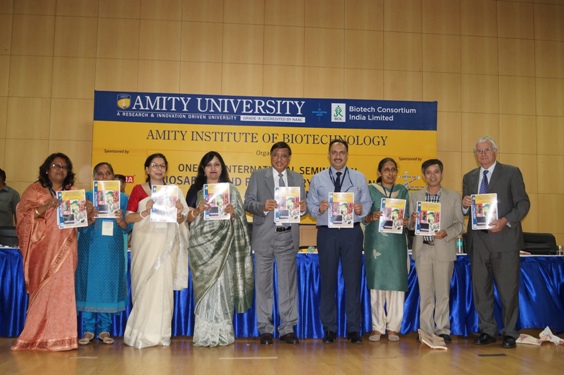09 Sep 2016|Noida | Amity Campus, Sector-125, Noida
Amity Institute of Biotechnology (AIB) in association with Biotech Consortium India Limited, New Delhi organised a day long International Seminar on ‘Biosafety and Regulatory Affairs on GMOs and GE Plants’

“National Bio- safety Framework essential toregulate the production and release of GM crops” aver experts during day longInternational Seminar on ‘Biosafetyand Regulatory Affairs on GMOs and GE Plants’ at Amity
Amity Institute of Biotechnology (AIB) in association with Biotech Consortium India Limited, New Delhi organised a day long International Seminar on ‘Biosafety and Regulatory Affairs on GMOs and GE Plants’ at University Campus, Sector-125, Noida.
The Seminar aimed at creating awareness and understanding of the use, bio-safety assessment and regulatory affairs with reference to Genetically Modified Organisms (GMO) and Genetically Engineered (GE) Crops.
Dr. T.R.Sharma, Director, National Research Centre on Plant Biotechnology (NRCPB), Delhi; Dr Ravi Khetarpal, Regional Advisor, Strategic Science Partnerships, South Asia, CABI, New Delhi and Dr. Ranjini Warrier,Former Advisor, Ministry of Environment, Forest and Climate Change, New Delhi, Dr. B Shukla- Vice Chancellor, Amity University and Dr. W Selvamurthy- President, Amity Science Technology and Innovation Foundation inaugurated the Conference.
Welcoming the august gathering, Dr Chanderdeep Tandon, Director, AIB said that the discussions and deliberations on GM crops are very relevant and timely since everybody is talking about GM crops. He stressed that Scientists believe that GM crops are safe, sustainable and desirable for increasing agricultural output and food security in the country whereas certain section of activists consider GM crops as harmful for bio-diversity and livelihood of farmers. He stressed that Seminar would help in bringing out the pros and cons,if any, associated with GMOs and GE Plants’ and would make people aware about the same.
Delivering the key note address, Dr. T.R. Sharma, Director, NRCPB, Delhi said with the drastic increase in Indian population, unpredictable climate change and newer diseases affecting the crops, it has become very important to increase the agricultural production through GM crops. He remarked that GM crops have been accepted worldwide and farmers in 28 countries have been growing GM Cotton, Rice, Soyabean, Sugarcane,Tomato, Canola, Potato, Papaya Sugarbeet etc. Corroborating his view point further, he stated that BT cotton was introduced in India in 2001-02 which increased the farm income from 14.6 million USD in 2001-02 to 2100 million USD in 2012-13 and there has been steep decline in the use of insecticides. He stressed that all GM foods have been extensively tested and they are as safe as other foods in the market place and the nutrition depends on the food, not the method of crop breeding. Dwelling on the importance of bio-safety regulations,he remarked that national bio safety framework is essential to regulate production and release of GMOs in any country practicing Biotechnology. The biosafety regulations ensure safe access to new products and technologies developed in the country and provide a level of public confidence that products placed in the marked have been assessed as safe for consumption. He averred that India has a stringent Regulatory mechanism for GMOs which ensure that only safe products go for commercialization He stressed that the adequate communication is required for acceptance of this technology and quoted “ that which is not understood is feared and that which is feared is opposed”.
Dr. Ranjini Warrier, Former Advisor,Ministry of Environment, Forest and Climate Change, New Delhi, while sharing her views, stated that the GM crops have been very controversial with divergent views on their viability, bringing out the socio- economical and ethical issues attached with them worldwide. She outlined that the one reason that is holding GM crops back is the public perception about the benefits associated with them. She lamented that many researchers in the country are not aware of IPR issues and Bio safety measures associated with GM crops. She suggested that since students are important stakeholders in promoting this technology, Biotechnology curriculum should include topics such as “Biosafety”and regulatory framework regarding GM crops needs to be strengthened further in the country. She congratulated the organizers for choosing an apt topic for the Seminar which will disseminate the knowledge about the various regulatory bodies keeping a check on GM crops.
Dr Ravi Khetarpal, Regional Advisor, Strategic Science Partnerships, South Asia, CABI, New Delhi advised students to focus on the outcome of the Seminar and try to gain maximum from the discussions and deliberations. He stated that the definition of Bio-safety for plants and animals is different and motivated students to learn more about Social Biotechnology, IPR issues in Biotechnology and Bio safety- the fields which offer numerous opportunities to the students.
The inauguration was followed by two Technical sessions on the themes “ GMOs and the Environment use” “Regulations of GMOs and GM crops” and “Biosafety Assessment and Regulatory Affairs” and “Biotechnology Revolution and Solution” by eminent National and International Experts such as Dr. Celia Chalam- Principal Scientist, NBPGR, Delhi; Dr. Julian Adams –Professor, Departments of Molecular Cellular and Developmental Biology and Ecology and Evolutionary Biology, University of Michigan, Ann Arbor; Dr. Carrie McMahon, Consumer Safety Office, Office of Food Additive Safety, Center for Food Safety and Applied Nutrition, United States Food and Drug Administration; Dr. Pham Van Toan, Associate Professor at the Vietnam Academy of Agricultural Sciences (VAAS) and others.